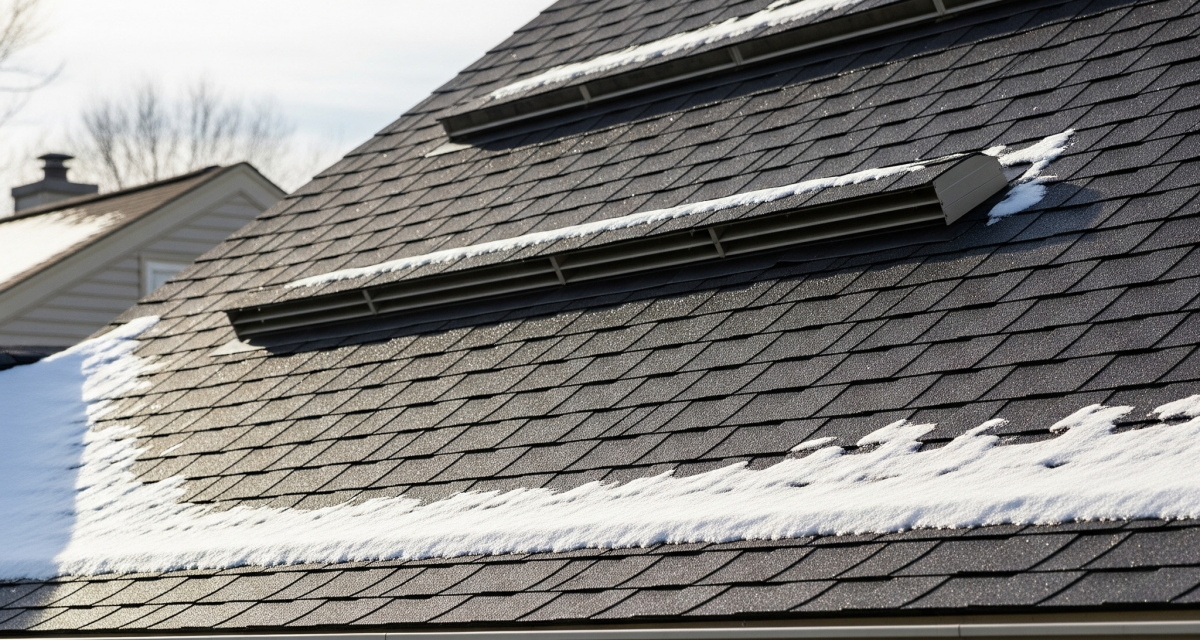Winter in New Jersey brings snow, freezing rain, and fluctuating temperatures. While snow-covered rooftops may look beautiful, they can also create a hidden danger — ice dams. Ice dams are thick ridges of ice that form at the edge of your roof, preventing melting snow from draining properly. Left unchecked, they can cause water leaks, damage shingles, and lead to costly repairs.
One of the most effective ways to stop ice dams before they start is by ensuring your home has proper roof ventilation. At All State Roofing & Chimney, we specialize in roof ventilation solutions for NJ homes. Call us at (862) 295-7864 or request a free estimate online to protect your home this winter.
What Are Ice Dams?
Ice dams occur when heat from your home escapes into the attic, warming the roof and causing snow to melt. As the melted snow flows down to the colder eaves, it refreezes, forming a dam of ice. This blockage traps water, which can back up under shingles and leak into your home.
Key dangers of ice dams:
-
Water damage to ceilings, walls, and insulation
-
Mold and mildew growth inside your home
-
Damaged shingles, flashing, and gutters
-
Increased risk of roof collapse under heavy snow
The Role of Roof Ventilation in Preventing Ice Dams
Proper roof ventilation keeps your attic cold and dry during winter. This minimizes uneven roof temperatures and reduces the melting/refreezing cycle that creates ice dams.
Here’s how it works:
-
Intake vents (usually in soffits) bring in cold, dry air from outside.
-
Exhaust vents (ridge or gable vents) let warm, moist air escape.
-
This steady airflow keeps attic temperatures closer to the outside air, preventing snowmelt from occurring at the top of the roof.
When combined with good attic insulation, proper ventilation creates a balanced system that dramatically lowers your risk of ice dams.
Benefits of Proper Roof Ventilation in NJ
-
Prevents Ice Dams and Leaks
By maintaining consistent attic temperatures, ventilation stops the snowmelt/refreeze cycle that causes ice dams. -
Protects Roofing Materials
Reducing moisture and heat buildup prolongs the life of shingles, underlayment, and wood structures. -
Improves Energy Efficiency
Balanced airflow lowers heating costs by keeping warm air where it belongs — inside your living space. -
Reduces Moisture and Mold
Proper ventilation removes moist air that could otherwise condense on rafters and insulation, preventing mold growth.
How to Tell if Your Roof Ventilation Is Inadequate
Signs of poor ventilation include:
-
Frequent ice dams or icicles forming at the roof edge
-
Uneven attic temperatures or damp insulation
-
Moldy smells coming from the attic
-
Curling or prematurely aging shingles
If you notice any of these warning signs, it’s time to have your attic and roof ventilation inspected.
All State Roofing & Chimney’s Ventilation Solutions
Our team provides comprehensive roof ventilation services tailored to NJ homes:
-
Installation of ridge, soffit, or gable vents
-
Evaluation of attic insulation and airflow
-
Upgrades to meet current building codes and best practices
-
Solutions for both pitched and flat roofs
We combine ventilation improvements with attic insulation to give you a complete system for preventing ice dams and saving on energy costs.
Tips for Homeowners
-
Have your attic inspected before winter to ensure proper ventilation.
-
Seal air leaks between your living space and attic to keep heat from escaping.
-
Clean gutters and downspouts so melting snow can drain freely.
-
Add insulation to bring your attic up to recommended R-values for New Jersey.
Protect Your Roof This Winter
Ice dams are more than just a nuisance — they’re a sign that your attic and roof need attention. With the right ventilation system, you can prevent damage, lower energy bills, and extend the life of your roof.
Call All State Roofing & Chimney today at (862) 295-7864 or request a free estimate online to learn how we can help keep your home safe this winter.
